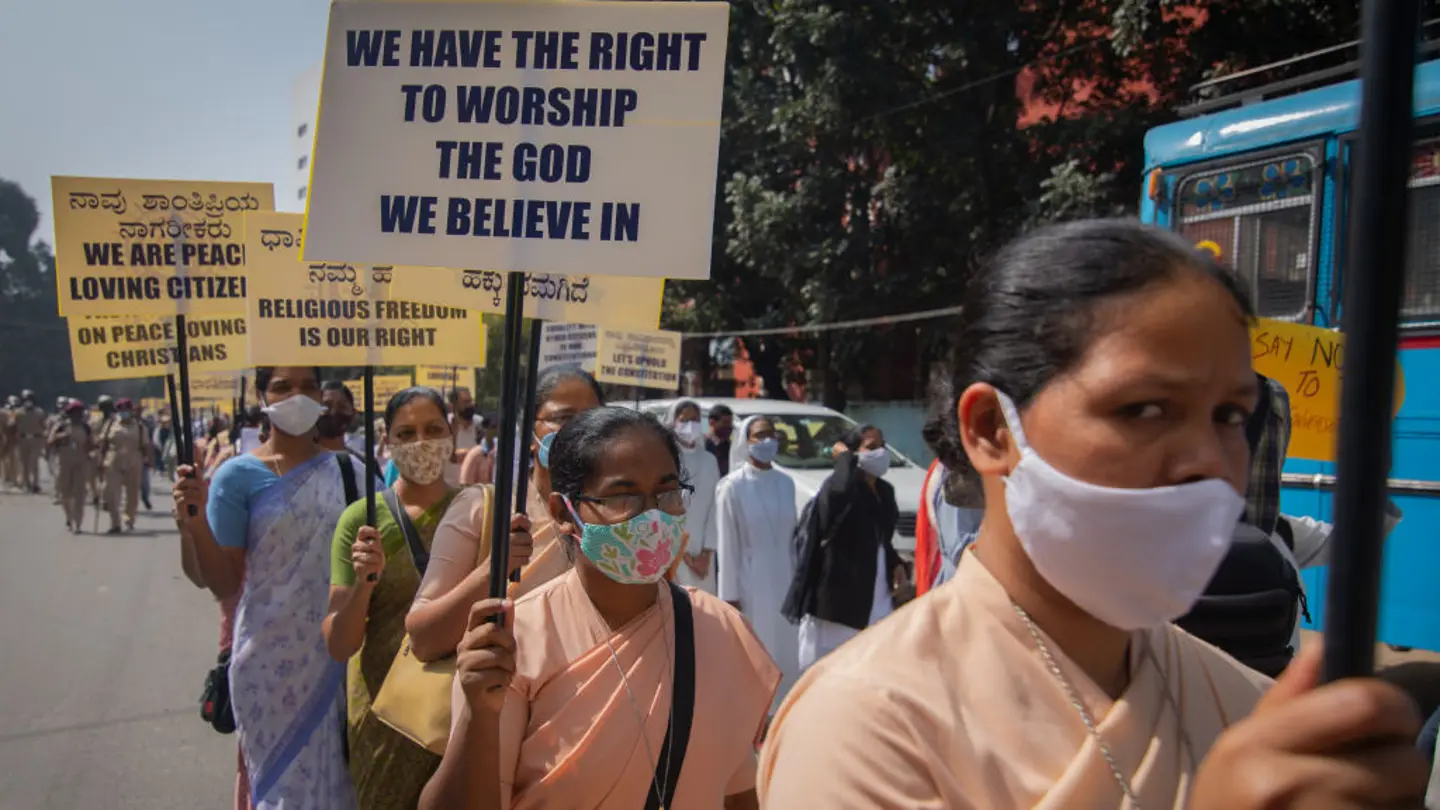Life in Suffering: How Christianity Continues to Thrive Amidst Global Persecution
Abhishek Chinnappa/Getty Images
In India, a Christian family was beaten and harassed by their neighbors and the Hindu nationalist group RSS. Ritesh, his wife Vanya, and their children became Christian in 2016. Despite their cautious and secretive practice of the faith, they could not avoid the omnipresent eyes of their Hindu village. Following intimidation and coercion by a group deployed by the RSS, the family was brought before Hindu leaders. They were interrogated, beaten, and later arrested.
In Mosul, Iraq, terrorists from the Islamic State of Syria and Iraq immolated a Christian girl. The militants approached her mother’s home, demanding that they pay a religious tax. The mother agreed, asking only to wait “a few seconds” for her daughter who was taking a shower. But they refused to wait. They lit the house on fire, and the 12-year-old succumbed to her fourth-degree burns a few hours later. Her last words: “Forgive them.”
In Chengdu and Guangzhou, China, authorities cracked down on Early Rain and Rongguili, two underground churches, in the weeks before Christmas. Members reported hearing the heavy footsteps of police officers and officials in the middle of Sunday School. The authorities seized cell phones and materials, and imprisoned over a dozen Christians.
Across the world, Christians have and are currently experiencing unthinkable persecution. Open Doors, an advocacy group, reports that at least 360 million Christians currently experience “high levels of persecution and discrimination.” 5,621 were murdered and 4,542 were detained in 2022. According to Pew, Christians face harassment in more countries than any other religious group. Even more concerningly, the perpetrators are mostly governments and public officials, not private actors.
Stories of abduction, imprisonment, killings, and abuse are disturbing, frequent, and blatantly state sanctioned. The freedom of religion is enshrined in the Universal Declaration of Human Rights. Yet in India, nearly half of the country’s states have passed anti-conversion laws. In Rampur, Uttar Pradesh, police arrested pastor Paulus Masih. His charge: “promising the ‘good life’” to the local Dalit community. In countries like Afghanistan, North Korea, Somalia, and Nigeria, persecution is “extreme” and Bibles must be smuggled in for people to read.
And yet, Christianity is surging in the very countries determined to eradicate it. In recent decades, the religion has pervaded China faster than anywhere else in the world. Ian Johnson, an author and journalist, describes Wang Yi, the imprisoned pastor of Early Rain Church, as possessing a “radical openness.” That entire church, despite fearing for their lives and risking their future, took pride in their faith. They embraced the reality of freedom that is so foundational to Christianity.
Sami Rahal, a pastor in Sudan, has been sheltering victims and refugees of the country’s civil war. His fervent compassion draws upon the hope of God’s justice and faith in his protection. Christian schools and churches across the country continue to care for thousands of displaced Sudanese people.
In spite of their own suffering, Christians have remained ingrained in the trenches of war, in the margins of society, in the suffering of their neighbors, effectuating radical love and proliferating in the unlikeliest of places.
I can’t help but juxtapose this faith with the politically-colored, disfigured worldview of American conservative evangelicals. The global Christians, persecuted across the world but still exuding compassion, astoundingly share the same faith — in theory — as those that believe Jesus was a white Republican or that Donald Trump was ordained by God to lead America. Even less extreme conservative evangelicals display little compassion in their hatred for undocumented immigrants or apathy for victims of police brutality. It is these same evangelicals that often claim to be persecuted by those across the aisle.
For many around me — classmates, friends, social advocates — the image of Christianity has been irreversibly marred by these political evangelicals. It has come to be defined by hate, conservatism, and fundamentalism. But there is another faith — one embraced by Ritesh and Vanya, Wang Yi, Sami Rahal, and the 12-year-old martyred girl — that is far more beautiful and true. A faith that truly brings healing by embodying suffering.
The crisis of Christian persecution is undoubtedly far larger than any one of us can tackle. But perhaps the first step of support and solidarity is becoming more open-minded and compassionate ourselves.
In February, in Delhi India, 22,000 Christians gathered in protest of religious discrimination. Leaders and activists shared their experiences of religious assault and targeting. They signed a memorandum demanding the protection of their rights. Organizing and advocating on behalf of the millions of Christians who are persecuted across the world is essential for justice.
Although the United States seems to be silent on this issue, it has responded to some degree. In 1998, the government passed the International Religious Freedom Act (IRFA) which created government entities like the U.S. Commission on International Religious Freedom (USCIRF), created a watch-list of state offenders, and included religious persecution-related provisions on refugee and asylum policy. However, the U.S. hasn’t been assertive nor condemning of offenders. Given the fact that most of the offenders are governmental actors, our government must do more to protect countless Christians who are imprisoned, abused, and killed.
The lack of care from our government and our media, our ignorance, and the villainous crimes perpetrated against Christians across the world are appalling. And yet these Christians have built ecosystems and havens in the trenches of war, thriving on their love for God and for their neighbors. Their resilience, faithfulness, and generosity embody the heart of Christianity, and serve as an inspiration to us all.

